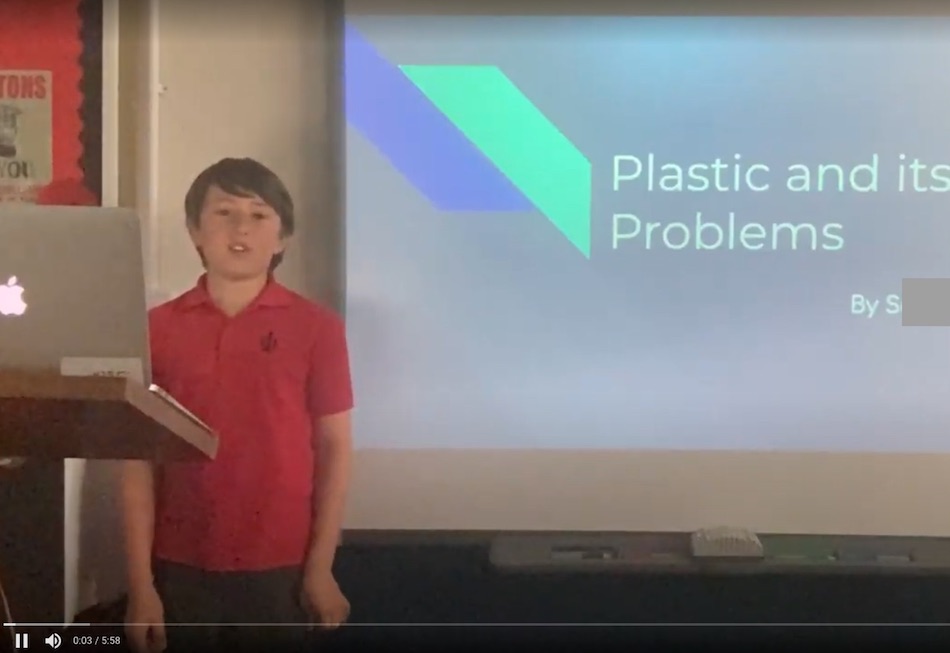One of the most difficult tasks that face us all on a daily basis is what is fact and what is opinion. We are all used to googling information but it is important to then assess this information and decide whether there is a bias, weighing up the value of the information.
This year our pupils in Year 8 who had finished their exams early wrote an extended essay and presented on the topic Is Plastic Good?
Pupils needed to research the information, judge its value, plan an extended essay and a present their information. This is a tall order for 12 and 13 year olds but honing a set of academic skills that were going to be needed for the future is a valuable exercise.
Below is the start of winning essay. Our external judge commented: “This essay stood out in various ways: beautifully written (he has a such a lovely way with words), clearly constructed and he obviously thought about and understood the brief, coming up with good practical solutions and presenting a very good and coherent argument.”
Next year we hope to offer this valuable academic exercise to more of our pupils.
Plastic - is it good? By Seth O
Plastic is a fascinating substance that has many amazing properties, making it one of the most useful materials in our world today. However, one of the most useful properties could also be our downfall: it never fully breaks down. This allows it to be used in the car industry, which is one of plastic’s biggest consumers as it makes up 50% of the volume of the average car. [Source: cen.acs.org]
This man-made material is both a blessing and a curse; it means that chairs, pens, reusable water bottles and more can last a lifetime to be used over and over again. However, this also causes a huge problem for the human race and our planet. Animals and habitats are destroyed by a substance put there by humans; humans are killing their own planet. Plastic is made from organic materials. Materials such as coal, crude oil, salt and natural gas can all be used. It is made up of thousands of compounds. Alkenes and alkanes are taken from splitting longer chains of hydrocarbons into smaller ones. These alkenes and alkanes are combined to make plastic.
“We are being choked to death by the amount of plastic that we throw away. It's killing our oceans. It’s entering into our bodies in the fish we eat.” Kevin Bacon
Plastic is useful in so many ways. One way that its use cannot be changed is in the world of medicine. Plastic is used to transport medicines more efficiently. It is ideal for transportation because it is non-reactive; it is light so the cost of transportation is reduced and it is exceptional at keeping medicines safe and bacteria free . Another reason for its use is it is good for keeping hospitals sterile, thus reducing infection. Plastic is often used once then thrown away - syringes, epi-pens, bags for disposing of used equipment and masks are all made to be thrown away to save time. Without the need to clean equipment, time can be saved that could be vital in saving someone's life. Plastic is also used to replace parts of prosthetic limbs and to replace metals people may be allergic to. Plastic is used to revolutionise the world of medicine in ways which would be nigh on impossible without plastic. For example: plastic vertebrae. “Imagine losing one or more vertebrae to trauma or cancer. Now imagine creating a replacement using biocompatible plastics and 3-D printing. Actually, you don’t need to imagine the latter. The FDA approved such a device in 2015, a load bearing design for long-term replacement of damaged or unstable vertebrae. The plastic mimics the mechanical properties of bone, enabling the body to adapt to the implant.” Plasticmakesitpossible.com
However, the key factor for using plastic in medicine is the fact that it is very cost effective. It is far cheaper than other alternatives such as glass or non-reactive metals.
My research has led me to believe that doctors could not live without plastic because it plays so many important roles in their lives. I asked my neighbour, a surgeon at the St. Richard’s Hospital, if he could work without plastic, he said: “No, doctors couldn’t work without plastic but our focus is to improve sustainability and use it in a greener way.” Medical information from mpo-mag.com.




